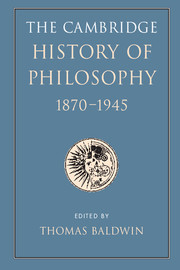Book contents
- Frontmatter
- Contents
- List of contributors
- Introduction
- I 1870–1914
- II 1914–1945
- 8 Logic and philosophy: the analytic programme
- 9 The diversity of philosophy
- 10 Knowledge, language, and the end of metaphysics
- 11 Philosophy and the exact sciences
- 46 First-order logic and its rivals
- 47 The golden age of mathematical logic
- 48 General relativity
- 49 Scientific explanation
- 50 The rise of probabilistic thinking
- 12 Mind and its place in nature
- 13 Philosophy and social science
- 14 Ethics, religion, and the arts
- 15 Law and politics
- Biobibliographical appendix
- Bibliography
- INDEX
- References
50 - The rise of probabilistic thinking
from 11 - Philosophy and the exact sciences
Published online by Cambridge University Press: 28 March 2008
- Frontmatter
- Contents
- List of contributors
- Introduction
- I 1870–1914
- II 1914–1945
- 8 Logic and philosophy: the analytic programme
- 9 The diversity of philosophy
- 10 Knowledge, language, and the end of metaphysics
- 11 Philosophy and the exact sciences
- 46 First-order logic and its rivals
- 47 The golden age of mathematical logic
- 48 General relativity
- 49 Scientific explanation
- 50 The rise of probabilistic thinking
- 12 Mind and its place in nature
- 13 Philosophy and social science
- 14 Ethics, religion, and the arts
- 15 Law and politics
- Biobibliographical appendix
- Bibliography
- INDEX
- References
Summary
PROBABILITY IN NINETEENTH-CENTURY SCIENCE
Variation was considered, well into the second half of the nineteenth century, to be deviation from an ideal value. This is clear in the ‘social physics’ of Adolphe Quetelet, where the ideal was represented by the notion of ‘average man’. In astronomical observation, the model behind this line of thought, there is supposed to be a true value in an observation, from which the actual value deviates through the presence of small erratic causes. In mathematical error theory, one could show that numerous small and mutually independent errors produce the familiar bell-shaped normal curve around a true value. But if observations contain a systematic error, this can be identified and its effect eliminated. All sorts of data regarding society were collected into public state records (whence comes the term statistics), showing remarkable statistical stability from year to year. Such stability, as in criminal records, was explained as the very nearly deterministic result of the sum of a great number of free individual acts (see Krüger et al. 1987 for studies of these developments).
Around 1860, the physicist James Clerk Maxwell theoretically determined a normal Gaussian distribution law for the velocities of gas molecules. This discovery later led to statistical mechanics in the work of Ludwig Boltzmann and Josiah Willard Gibbs. Here there was no true unknown value, but genuine variation not reducible to effects of external errors. The world view of classical physics held that all motions of matter follow the deterministic laws of Newtonian mechanics. It was therefore argued, throughout the second half of the nineteenth century, and well into the twentieth, that there is an inherent contradiction in the foundations of statistical physics.
- Type
- Chapter
- Information
- The Cambridge History of Philosophy 1870–1945 , pp. 621 - 628Publisher: Cambridge University PressPrint publication year: 2003
References
- 1
- Cited by



